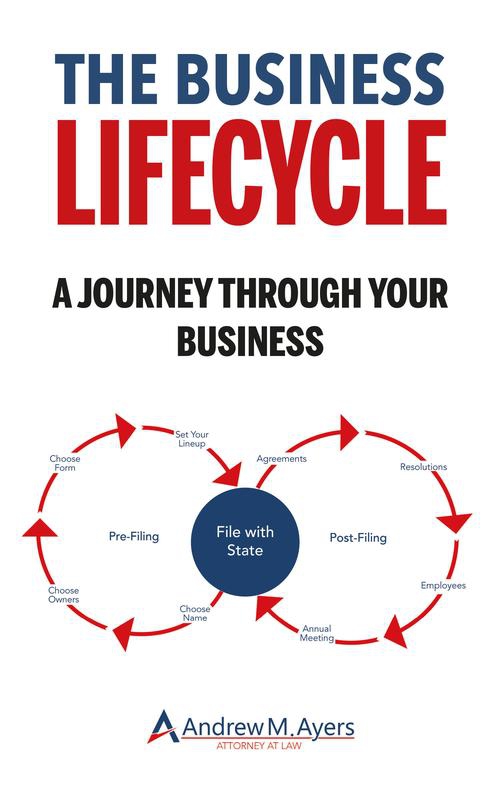 One of the areas where estate planning and business law intersect is when the owner of a business dies. While many people who reach out to me are looking for a simple answer, the reality is that what happens to the business next can be a complex riddle to solve. There's no blanket answer as to what happens in all businesses, but the most common answer is to look at the business' ownership documents.
One of the areas where estate planning and business law intersect is when the owner of a business dies. While many people who reach out to me are looking for a simple answer, the reality is that what happens to the business next can be a complex riddle to solve. There's no blanket answer as to what happens in all businesses, but the most common answer is to look at the business' ownership documents.
Sorting out the ownership of a company after an owner passes away is not always as dramatic as it may seem in television and movies. In reality, there is often a straightforward answer and your role as the spouse is to get that answer and execute on what needs to happen next. There can be challenges if your spouse was a licensed professional and it's an industry you are not licensed in as well, but hopefully before they passed away they did the right planning for a smooth transition.
So before you make an assumption that you automatically get to take over your spouse's business, remember that we need to look at the business structure, whether your spouse had an estate plan, and your state's laws on what happens.
Business Structure
What happens next with the ownership interest depends on what type of business structure your spouse had set up. Looking at four common types of structures, we can see the different outcomes:
Sole Proprietorship
If the business is a sole proprietorship, it is not a separate legal entity from the owner. This means the business ceases to operate upon the owner's death. The assets and liabilities of the business become part of the owner's estate and are distributed according to their will or state intestacy laws if there is no will. The spouse may inherit the business assets, but this does not automatically mean they inherit the business itself.
Partnership
In a partnership, the fate of the business upon the death of a partner is usually governed by the partnership agreement. If there is no agreement, state laws will apply. Generally, the deceased partner's share of the business becomes part of their estate. The surviving partners may buy out the deceased partner's share, or the spouse may inherit the share and become a new partner, depending on the terms of the partnership agreement.
Limited Liability Company (LLC)
For an LLC, the operating agreement typically dictates what happens upon the death of a member. The agreement may allow the business to continue operating with the deceased member's interest being transferred to a spouse or other heirs. If there is no operating agreement, state laws will determine the outcome, which may involve the dissolution of the LLC or transfer of the deceased member's interest to their estate.
Corporation
In a corporation, ownership is represented by shares of stock. These shares can be inherited by a spouse if specified in the will or through state intestacy laws. The corporation itself continues to operate as it is a separate legal entity from its owners. The spouse may inherit the shares and gain an ownership interest in the corporation, potentially influencing its operations if they inherit a significant portion.
Estate Planning for Your Business
If your spouse has a will and an estate plan, those documents are crucial in determining what happens to a business after the owner's death. A well-drafted estate plan can specify who inherits the business and under what conditions. This can include:
- Designating a successor: The owner can name a specific person, such as their spouse, to take over the business.
- Setting up a buy-sell agreement: This allows remaining owners or partners to buy out the deceased owner's interest, providing liquidity to the spouse or heirs.
- Creating a trust: The business can be placed in a trust, ensuring it continues to operate smoothly while providing income to the spouse and other beneficiaries.
Without a will or estate plan, the business becomes subject to state intestacy laws and a probate court will need to make rulings on the future of the business, which may not align with the owner's wishes. This can lead to complications and disputes among heirs, potentially harming the business's continuity and value.
What Does the Law Say?
State laws play a significant role in determining what happens to a business when the owner dies without a will. These laws vary by state and dictate how assets, including business interests, are distributed among surviving family members. Generally, if there is no will, the spouse is likely to inherit a significant portion of the estate, but this can vary based on:
- Community property states: In these states, assets acquired during the marriage are considered community property and are typically divided equally between the surviving spouse and other heirs.
- Common law states: These states have different rules, and the distribution of assets can vary widely.
Understanding state laws is essential for business owners to ensure their wishes are carried out and to minimize potential conflicts.
Tips for Business Owners
To ensure a smooth transition and protect the business and family interests, business owners should take several practical steps:
- Create a comprehensive estate plan: Include provisions for the business and designate a successor.
- Draft a will: Clearly outline the distribution of business assets and interests.
- Develop a buy-sell agreement: If in a partnership or corporation, this can provide clarity and liquidity.
- Review and update documents regularly: Ensure all documents reflect current wishes and circumstances.
- Consult professionals: Work with estate planning attorneys and financial advisors to create a robust plan.
Whether a spouse inherits a business upon the owner's death depends on several factors, including the business structure, the presence of a will or estate plan, and state laws. By understanding these elements and taking proactive steps, business owners can ensure their business continues to thrive and their family's financial future is secure.
Do I Need a Business Attorney?
Now is a good time to get up to date on your corporate documents, so if you'd like to discuss them further, let's schedule a Legal Strategy Session online or by calling my Edina, Minnesota office at (612) 294-6982 or my New York City office at (646) 847-3560. My office will be happy to find a convenient time for us to have a phone call to review the best options and next steps for you and your business.





